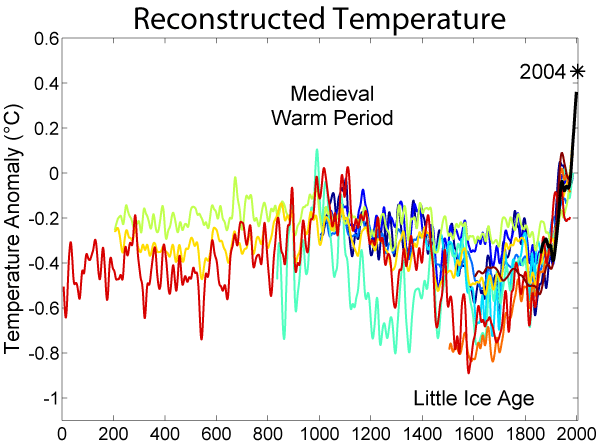Quiz RI.7: Global Warming
Name:________________________________________________ Date:________________
Global Warming
Read the following article and look closely at the graphic which accompanies it. The darker lines on the graph represent data from more recent studies. Answer the four questions which follow.
Standard: CCSS.ELA-Literacy.RI.9-10.7 Analyze various accounts of a subject told in different mediums (e.g., a person’s life story in both print and multimedia), determining which details are emphasized in each account.
To the Horror of Global Warming Alarmists, Global Cooling is Here
The increase in global temperatures since the late 19th century just reflects the end of the Little Ice Age. The global temperature trends since then have followed not rising CO2 trends but the ocean temperature cycles of the Pacific Decadal Oscillation (PDO) and the Atlantic Multidecadal Oscillation (AMO). Every 20 to 30 years, the much colder water near the bottom of the oceans cycles up to the top, where it has a slight cooling effect on global temperatures until the sun warms that water. That warmed water then contributes to slightly warmer global temperatures, until the next churning cycle.
Those ocean temperature cycles, and the continued recovery from the Little Ice Age, are primarily why global temperatures rose from 1915 until 1945, when CO2 emissions were much lower than in recent years. The change to a cold ocean temperature cycle, primarily the PDO, is the main reason that global temperatures declined from 1945 until the late 1970s, despite the soaring CO2 emissions during that time from the postwar industrialization spreading across the globe.
The 20 to 30 year ocean temperature cycles turned back to warm from the late 1970s until the late 1990s, which is the primary reason that global temperatures warmed during this period. But that warming ended 15 years ago, and global temperatures have stopped increasing since then, if not actually cooled, even though global CO2 emissions have soared over this period. As The Economist magazine reported in March, “The world added roughly 100 billion tonnes of carbon to the atmosphere between 2000 and 2010. That is about a quarter of all the CO2 put there by humanity since 1750.” Yet, still no warming during that time. That is because the CO2 greenhouse effect is weak and marginal compared to natural causes of global temperature changes.
- Peter Ferrara

1. Does the graph above support the claims of the article?
__________________________________________________________________________
__________________________________________________________________________
__________________________________________________________________________
2. Which do you find more convincing, the article or the graph? Why?
__________________________________________________________________________
__________________________________________________________________________
__________________________________________________________________________
3. What information is present in the text which is not present in the graph?
__________________________________________________________________________
__________________________________________________________________________
__________________________________________________________________________
4. What information is present in the graph which is not present in the text?
__________________________________________________________________________
__________________________________________________________________________
__________________________________________________________________________
Rohde, Robert. 2000 Year Temperature Comparison. 2005. Photograph. GlobalWarmingArtWeb. 12 Jun 2013. <http://www.globalwarmingart.com/wiki/File:2000_Year_Temperature_ Comparison_png>.
Ferrara, Peter. "To The Horror Of Global Warming Alarmists, Global Cooling Is Here." Forbes. 26 May 2013: n. page. Web. 12 Jun. 2013. <http://www.forbes.com/sites/peterferrara/2013/05/2 6/to-the-horror-of-global-warming-alarmists-global-cooling-is-here/>.